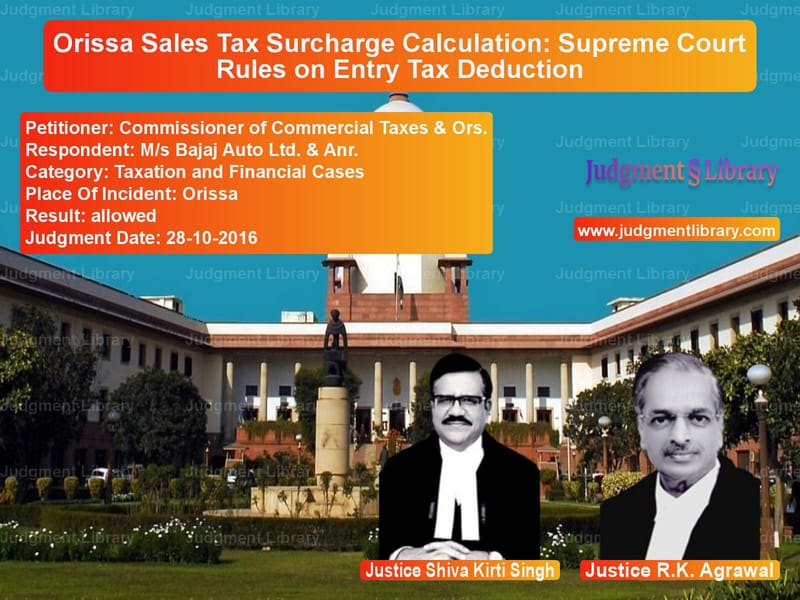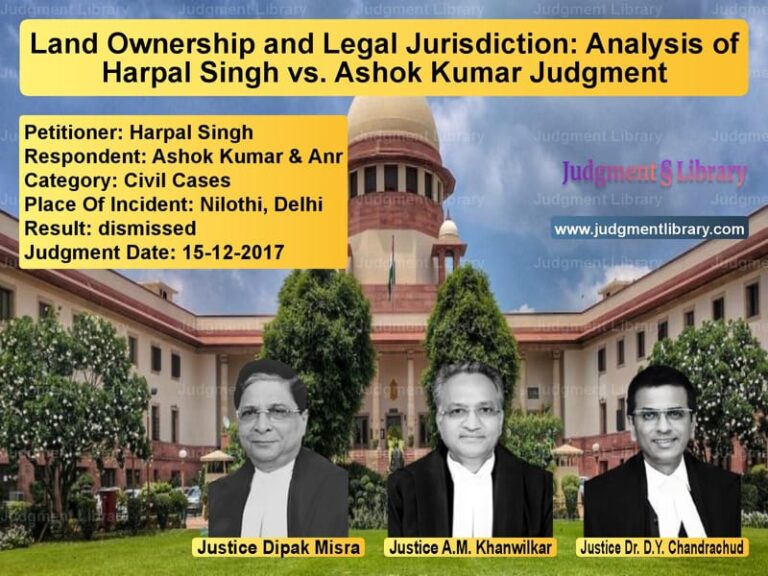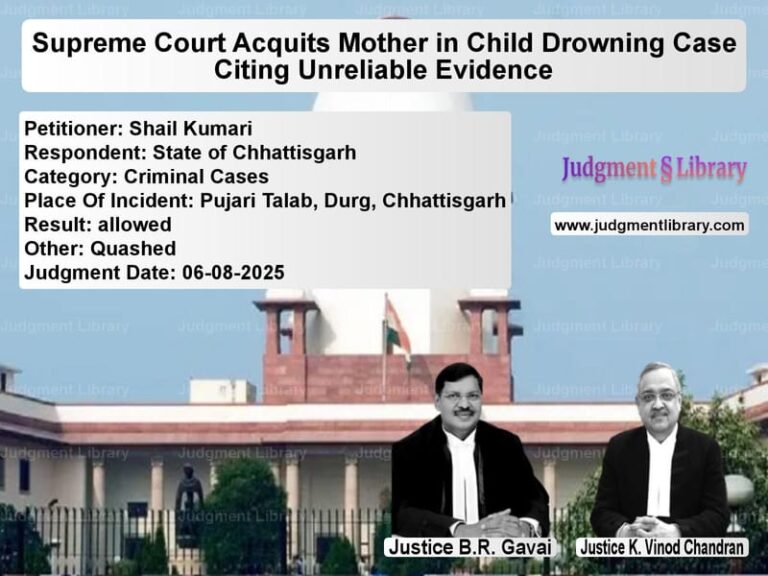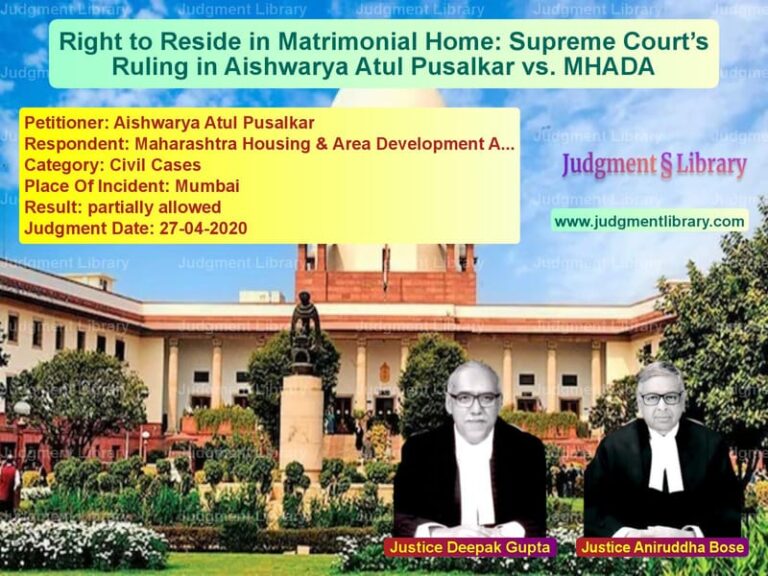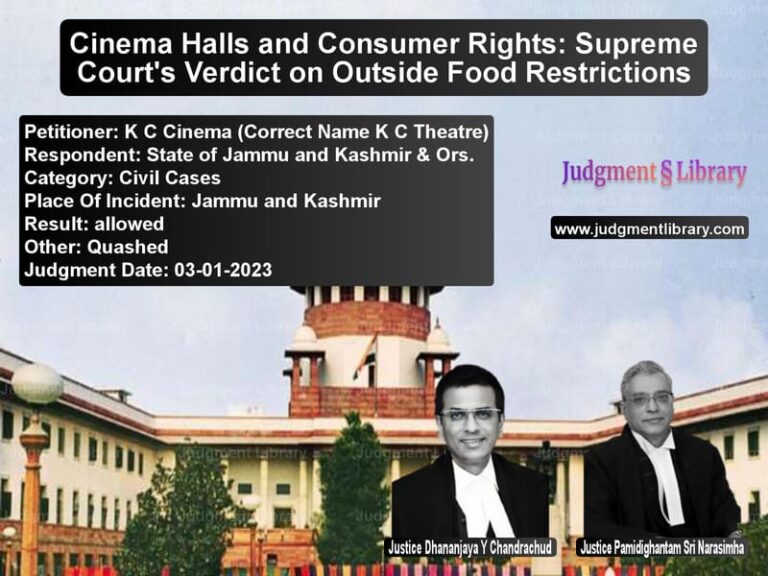Orissa Sales Tax Surcharge Calculation: Supreme Court Rules on Entry Tax Deduction
The case of Commissioner of Commercial Taxes & Ors. vs. M/s Bajaj Auto Ltd. & Anr. is a landmark judgment concerning the computation of surcharge under the Orissa Sales Tax Act, 1947 (OST Act) and the applicability of deductions for entry tax paid under the Orissa Entry Tax Act, 1999 (OET Act). The Supreme Court overturned the High Court of Orissa’s decision, ruling that surcharge under Section 5A of the OST Act must be computed on the gross sales tax payable, without any prior deduction of entry tax.
Background of the Case
The case arose when the Orissa Finance Department issued a notification on 20.11.2001, instructing tax authorities to compute surcharge on the total sales tax payable, rather than the amount remaining after deducting entry tax. This impacted several automobile dealers, including Bajaj Auto Ltd., who had previously calculated surcharge after deducting entry tax.
The key facts of the case are:
- Dealers in Orissa, including Bajaj Auto Ltd., were registered under both the OST Act and the Central Sales Tax Act.
- They were liable to pay entry tax under Section 3(3) of the OET Act when bringing motor vehicles into Orissa.
- Initially, they computed surcharge under Section 5A of the OST Act after deducting entry tax paid on motor vehicles.
- The Orissa Finance Department’s notification on 20.11.2001 directed surcharge to be calculated on the total tax payable before deducting entry tax.
- The Sales Tax Officer, Sambalpur-I Circle, issued an order on 30.03.2002, demanding additional surcharge from Bajaj Auto Ltd.
- The company challenged this order before the Orissa High Court, which ruled in their favor on 05.01.2007.
Legal Issues Raised
- Whether surcharge under Section 5A of the OST Act should be computed before or after deducting entry tax paid under the OET Act.
- Whether the Orissa Finance Department’s clarification was legally valid.
- Whether the illustration provided under Rule 18 of the Orissa Entry Tax Rules, 1999, had binding legal authority.
Arguments by the Parties
Arguments by the Appellants (Commissioner of Commercial Taxes & Ors.)
- There is no provision in the OET Act or Rules that alters the computation of surcharge under Section 5A of the OST Act.
- Section 4 of the OET Act only allows a reduction of liability under the Sales Tax Act to the extent of entry tax paid; it does not modify how surcharge is computed.
- As surcharge is a part of tax, it should be computed on the gross sales tax payable before deducting entry tax.
Arguments by the Respondents (Bajaj Auto Ltd. & Anr.)
- The Orissa Commercial Tax Department had previously issued clarifications allowing surcharge computation after deducting entry tax.
- Rule 18 of the Orissa Entry Tax Rules provides an illustration showing that sales tax payable should be reduced by entry tax before surcharge is levied.
- The interpretation favoring taxpayers should be upheld to maintain consistency in tax assessment.
Supreme Court’s Observations
The Supreme Court examined the relevant provisions and made the following key observations:
- The illustration provided in Rule 18 of the Orissa Entry Tax Rules does not override statutory provisions and cannot curtail or expand the law.
- As established in previous judgments, a surcharge is an additional tax and must be computed in the same manner as the primary tax.
- Section 5A of the OST Act explicitly states that surcharge is payable on the total amount of tax due and does not provide for deductions.
- The Finance Department’s notification was a valid interpretation of tax laws and correctly instructed tax officers to compute surcharge before entry tax deductions.
Final Judgment
The Supreme Court ruled in favor of the Commissioner of Commercial Taxes & Ors. and held:
- Surcharge under Section 5A of the OST Act must be computed on the gross amount of sales tax payable.
- Entry tax paid under the OET Act should not be deducted before computing surcharge.
- The Orissa High Court’s judgment dated 05.01.2007 was set aside.
- The additional surcharge demanded by the tax authorities was legally valid.
Implications of the Judgment
For Businesses and Taxpayers
- Companies must now calculate surcharge on the total sales tax payable, without reducing it for entry tax.
- Taxpayers need to re-evaluate their tax liabilities and adjust their accounting practices accordingly.
For Tax Authorities
- The ruling strengthens the government’s position in tax assessments.
- It ensures uniform computation of surcharge across all registered dealers.
For Legal Interpretation
- Illustrations provided in tax rules cannot override or modify statutory provisions.
- Surcharge must be treated as an integral part of tax and computed as per the primary tax law.
Conclusion
The Supreme Court’s decision in Commissioner of Commercial Taxes & Ors. vs. M/s Bajaj Auto Ltd. & Anr. provides much-needed clarity on surcharge computation under the Orissa Sales Tax Act. The ruling establishes that surcharge should be calculated on gross tax payable, reinforcing the government’s approach to tax assessment while ensuring consistency in taxation laws.
Don’t miss out on the full details! Download the complete judgment in PDF format below and gain valuable insights instantly!
Download Judgment: Commissioner of Comm vs Ms Bajaj Auto Ltd. Supreme Court of India Judgment Dated 28-10-2016.pdf
Direct Downlaod Judgment: Direct downlaod this Judgment
See all petitions in Income Tax Disputes
See all petitions in Tax Evasion Cases
See all petitions in Banking Regulations
See all petitions in Judgment by Shiva Kirti Singh
See all petitions in Judgment by R K Agrawal
See all petitions in allowed
See all petitions in supreme court of India judgments October 2016
See all petitions in 2016 judgments
See all posts in Taxation and Financial Cases Category
See all allowed petitions in Taxation and Financial Cases Category
See all Dismissed petitions in Taxation and Financial Cases Category
See all partially allowed petitions in Taxation and Financial Cases Category

